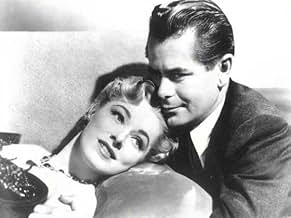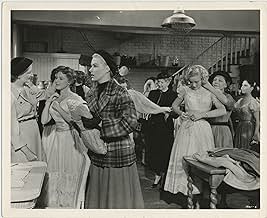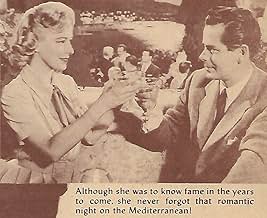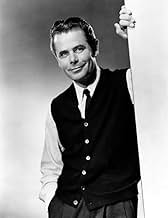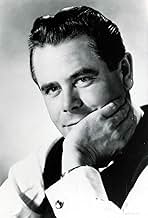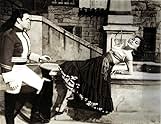VALUTAZIONE IMDb
6,7/10
1290
LA TUA VALUTAZIONE
Aggiungi una trama nella tua linguaThis movie chronicles Australian-born opera star Marjorie Lawrence's success, her battle with polio, and her eventual career comeback.This movie chronicles Australian-born opera star Marjorie Lawrence's success, her battle with polio, and her eventual career comeback.This movie chronicles Australian-born opera star Marjorie Lawrence's success, her battle with polio, and her eventual career comeback.
- Regia
- Sceneggiatura
- Star
- Vincitore di 1 Oscar
- 1 vittoria e 3 candidature totali
Phyllis Altivo
- Louise
- (non citato nei titoli originali)
Benjie Bancroft
- Doctor
- (non citato nei titoli originali)
Francis Barnes
- Singer
- (non citato nei titoli originali)
Louise Bates
- Party Guest
- (non citato nei titoli originali)
Mary Bayless
- Backstage Well-Wisher
- (non citato nei titoli originali)
George Blagoi
- Audience Member
- (non citato nei titoli originali)
Heinz Blankenburg
- Baritone
- (non citato nei titoli originali)
Lulu Mae Bohrman
- Backstage Well-Wisher
- (non citato nei titoli originali)
Recensioni in evidenza
Eleanor Parker is one of my favorite actresses from the '40s and '50s and does a marvelous job here, lip-synching to perfection various Wagnerian opera arias (as well as Puccini and Verdi). The storyline is somewhat similar to that of Jane Froman's career in that both were singers who, although paralyzed, continued with their singing careers and entertained servicemen as well. Glenn Ford lends solid support as the understanding, long-suffering husband who is always there when she needs his moral support. Roger Moore has a small role as her brother.
Everything moves smoothly under Curtis Bernhardt's direction. The opera segments are beautifully staged and filmed (in gorgeous technicolor, of course). Parker demonstrates her acting skills to the fullest and Eileen Farrell does a superb job on the vocal dubbing.
Well worth your time--inspirational and enjoyable even if you're not an opera lover. Filmed in wide screen technique, it loses something on video showings.
Everything moves smoothly under Curtis Bernhardt's direction. The opera segments are beautifully staged and filmed (in gorgeous technicolor, of course). Parker demonstrates her acting skills to the fullest and Eileen Farrell does a superb job on the vocal dubbing.
Well worth your time--inspirational and enjoyable even if you're not an opera lover. Filmed in wide screen technique, it loses something on video showings.
I am a great-niece of Marjorie Lawrence. It's a very sad fact that Marjorie is best known outside of Australia. However, she was recently honored as one of 100 Australian Entertainers of the Century. It's also a bit of a shame that this movie is a Hollywood producer's interpretation of an American publisher's version of my Great-Aunt's life. The real family story is actually much more interesting. Auntie Marj never smoked a cigarette in her life - but it seems everyone smoked in the movies of the 50s. My mother and my aunt attended the world premiere here in Melbourne. I remember meeting Auntie Marj as a child in the 70s.
Like others commenting on this film, I saw "Interrupted Melody" many years ago, and it left a deep impression on me. I found when watching it again that I had retained so many of the scenes in my memory.
"Interrupted Melody" tells the story of Australian soprano Marjorie Lawrence (played by Eleanor Parker), who was stricken with polio at the height of her career. The singer then has to find the courage to reclaim her will to live, her voice, and her career.
This is one of the few films, including anything of Lanza's, where entire arias and/or operatic scenes have been performed - and correctly. Singing for Ms. Parker is dramatic soprano Eileen Farrell, whose voice also acts. In the beginning, when the young Marjorie is in a vocal competition, Farrell takes her powerful chest voice out and instead carries her middle voice down to the low notes, giving the impression of a young, untrained singer. Truly inspired.
This has to be the high point of Eleanor Parker's career. I had a chance to see her nearly 30 years ago in a preview performance of "Pal Joey" - regretfully, there were many problems and she and her costar left the show before it opened. It was a shame, because Parker's Vera was wonderful. Here, she plays the young Marjorie with energy and determination, capturing the soprano's nervousness at being away from home when she goes to school in Monte Carlo. Later, she plays the perfect diva not afraid to state what she wants. Finally, she's the crippled Marjorie with no will to live, finding solace entertaining wounded soldiers who are worse off than she is. All through the film, she looks absolutely stunning, and her lipsyncing in Italian, French, and German is perfect.
The music is glorious - "Tristan und Isolde," "La Boheme," "Samson et Delilah," "Carmen," "Il Trovatore," (the fastest I've ever heard it), "Madama Butterfly," "Don Carlos," and "Gotterdammerung" - truly a feast for the ears with Eileen Farrell's magnificent singing.
Some have questioned whether or not Lawrence actually sang both mezzo and soprano roles. Lawrence did sing "Carmen," which can be sung by a dramatic soprano. Also, Lawrence probably started out as a mezzo - it was not until she trained in Paris that her upper range was extended. She sang Wagner, Strauss, Puccini, and Verdi in the big opera houses. "Samson and Delilah" was perhaps done for the film so we could see Eleanor Parker being sexy and seductive in a gauzy costume. The thing is, Lawrence's specialty was Wagner and you can't only have heavy Wagner scenes throughout a movie. The glamorous soprano did her own dancing in "Salome," and played the immolation scene in "Götterdämmerung" by riding her horse into the flames as Wagner had intended, making her one of the few, possibly the only, soprano to do this. She also did Thais, which calls for sex and beauty - "Thais" was the inspiration for the role Susan Kane bombed in during "Citizen Kane."
Glenn Ford plays Lawrence's husband, Dr. Thomas King, and the marriage of a successful opera star and fledgling pediatrician is realistically portrayed with all its difficulties. In real life, Tom King was an osteopath and a Christian Scientist. Ford has a background role much of the time, but also some very dramatic moments and some romantic ones. His gentle, easygoing style fit the character well. A very young Roger Moore is Marjorie's manager-brother.
If you love opera, or if you love a story of courage and the power of the human spirit, this film is for you. Have a box of tissues nearby - the ending is very powerful.
"Interrupted Melody" tells the story of Australian soprano Marjorie Lawrence (played by Eleanor Parker), who was stricken with polio at the height of her career. The singer then has to find the courage to reclaim her will to live, her voice, and her career.
This is one of the few films, including anything of Lanza's, where entire arias and/or operatic scenes have been performed - and correctly. Singing for Ms. Parker is dramatic soprano Eileen Farrell, whose voice also acts. In the beginning, when the young Marjorie is in a vocal competition, Farrell takes her powerful chest voice out and instead carries her middle voice down to the low notes, giving the impression of a young, untrained singer. Truly inspired.
This has to be the high point of Eleanor Parker's career. I had a chance to see her nearly 30 years ago in a preview performance of "Pal Joey" - regretfully, there were many problems and she and her costar left the show before it opened. It was a shame, because Parker's Vera was wonderful. Here, she plays the young Marjorie with energy and determination, capturing the soprano's nervousness at being away from home when she goes to school in Monte Carlo. Later, she plays the perfect diva not afraid to state what she wants. Finally, she's the crippled Marjorie with no will to live, finding solace entertaining wounded soldiers who are worse off than she is. All through the film, she looks absolutely stunning, and her lipsyncing in Italian, French, and German is perfect.
The music is glorious - "Tristan und Isolde," "La Boheme," "Samson et Delilah," "Carmen," "Il Trovatore," (the fastest I've ever heard it), "Madama Butterfly," "Don Carlos," and "Gotterdammerung" - truly a feast for the ears with Eileen Farrell's magnificent singing.
Some have questioned whether or not Lawrence actually sang both mezzo and soprano roles. Lawrence did sing "Carmen," which can be sung by a dramatic soprano. Also, Lawrence probably started out as a mezzo - it was not until she trained in Paris that her upper range was extended. She sang Wagner, Strauss, Puccini, and Verdi in the big opera houses. "Samson and Delilah" was perhaps done for the film so we could see Eleanor Parker being sexy and seductive in a gauzy costume. The thing is, Lawrence's specialty was Wagner and you can't only have heavy Wagner scenes throughout a movie. The glamorous soprano did her own dancing in "Salome," and played the immolation scene in "Götterdämmerung" by riding her horse into the flames as Wagner had intended, making her one of the few, possibly the only, soprano to do this. She also did Thais, which calls for sex and beauty - "Thais" was the inspiration for the role Susan Kane bombed in during "Citizen Kane."
Glenn Ford plays Lawrence's husband, Dr. Thomas King, and the marriage of a successful opera star and fledgling pediatrician is realistically portrayed with all its difficulties. In real life, Tom King was an osteopath and a Christian Scientist. Ford has a background role much of the time, but also some very dramatic moments and some romantic ones. His gentle, easygoing style fit the character well. A very young Roger Moore is Marjorie's manager-brother.
If you love opera, or if you love a story of courage and the power of the human spirit, this film is for you. Have a box of tissues nearby - the ending is very powerful.
I studied opera with Marjorie Lawrence and her students always enjoyed gathering to watch this film.
I studied opera with Marjorie Lawrence in the 1970's and she was an incredible, vital, and exciting personality. She was larger than life and her presence dominated any gathering she attended.
The movie captures many of her physical mannerisms. Her voice was most suited to the Wagnerian repertoire and the selection of the great Eileen Farrel to sing the more popular arias chosen for the film was an excellent one. However, Miss Lawrence was disappointed that her own voice wasn't used as had been agreed, which I understand resulted in a settlement in her favor.
Her husband, Doctor King, was an great gentleman and devoted to her.
Following the years depicted in the film, she became an educator at Southern Illinois University where she was very respected and loved.
The movie captures many of her physical mannerisms. Her voice was most suited to the Wagnerian repertoire and the selection of the great Eileen Farrel to sing the more popular arias chosen for the film was an excellent one. However, Miss Lawrence was disappointed that her own voice wasn't used as had been agreed, which I understand resulted in a settlement in her favor.
Her husband, Doctor King, was an great gentleman and devoted to her.
Following the years depicted in the film, she became an educator at Southern Illinois University where she was very respected and loved.
The film does a fine job with the crippling illness of Lawrence and her comeback onstage, but most notable are the performances by the stars. Glenn Ford and Eleanor Parker were never better. Just superb. The scene where she tried to commit suicide and Ford stopped her, broke down, and asked God for help is magnificent and a must-see. Ford and Parker should be well-remembered as excellent actors.
Lo sapevi?
- QuizEleanor Parker can read music, and has perfect pitch as a singer. She decided to study the scores of the opera songs used in this movie on her own. She rented a cabin in Lake Arrowhead, California, and played the records while singing along, until she had the breathing and phrasing memorized. Then when filming the scenes, instead of lip-synching to the tracks recorded by Eileen Farrell for the movie, she sang full voice (but an octave lower). She is proud of the fact that they never had to do a re-take, in order to "match" the tapes. She nailed it on the first take every time.
- BlooperAfter Marjorie sings "Annie Laurie" and she wheels herself into the kitchen and she suggests a concert tour, right as she and Dr. King are embracing .
- Citazioni
Marjorie Lawrence: [drinking champagne] Tonight I love the whole world and I want them to know it.
Dr. Thomas King: And tomorrow you'll have a monumental hangover.
Marjorie Lawrence: That's the advantage of going out with doctors.
- ConnessioniFeatured in 1955 Motion Picture Theatre Celebration (1955)
- Colonne sonoreDon Carlos
(1867) (uncredited)
Music by Giuseppe Verdi
Libretto by François Joseph Méry and Camille du Locle
Aria "O don fatale" Performed by Eleanor Parker (dubbed by Eileen Farrell) with piano accompaniment
I più visti
Accedi per valutare e creare un elenco di titoli salvati per ottenere consigli personalizzati
- How long is Interrupted Melody?Powered by Alexa
Dettagli
- Data di uscita
- Paese di origine
- Lingue
- Celebre anche come
- La melodía interrumpida
- Luoghi delle riprese
- Azienda produttrice
- Vedi altri crediti dell’azienda su IMDbPro
Botteghino
- Budget
- 2.367.000 USD (previsto)
- Tempo di esecuzione1 ora 46 minuti
- Proporzioni
- 2.55 : 1
Contribuisci a questa pagina
Suggerisci una modifica o aggiungi i contenuti mancanti

Divario superiore
By what name was Oltre il destino (1955) officially released in India in English?
Rispondi


